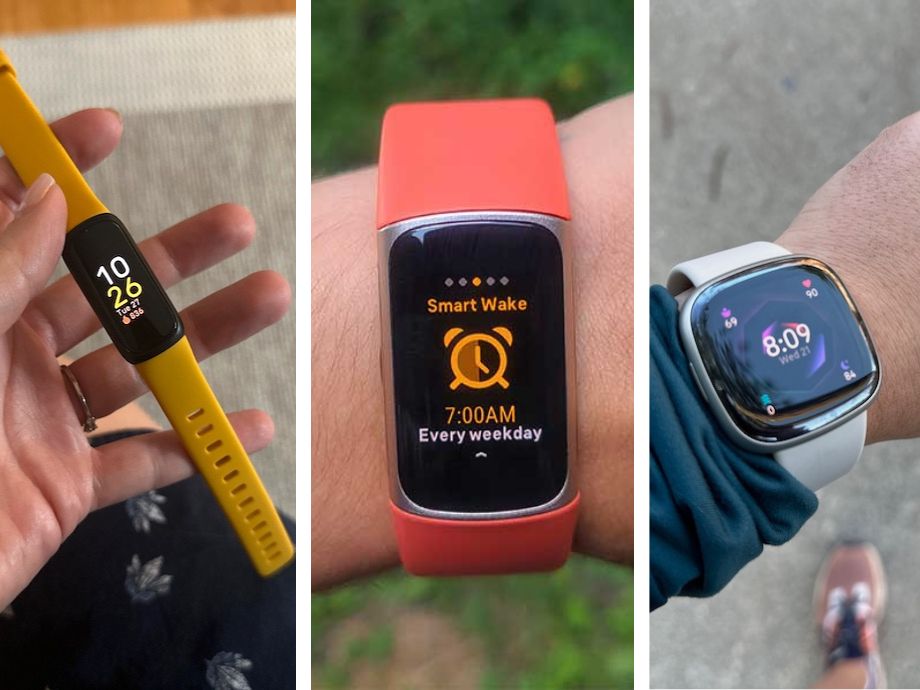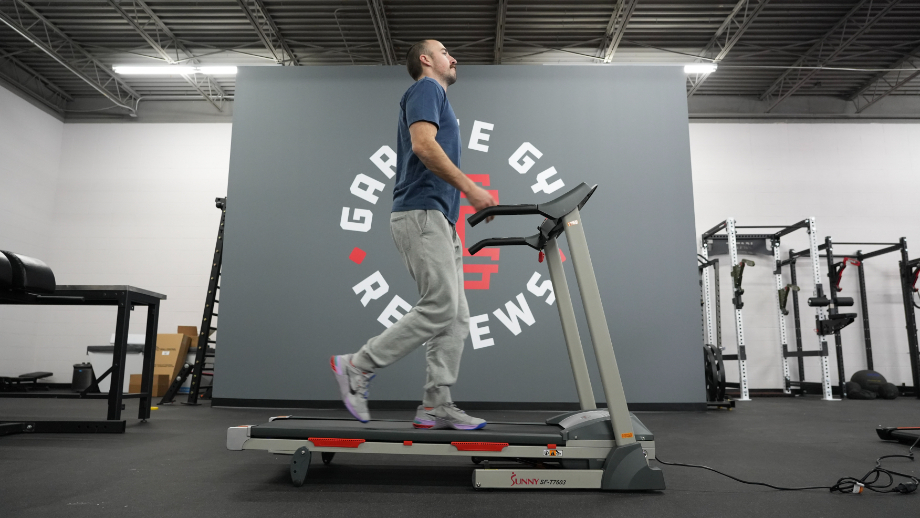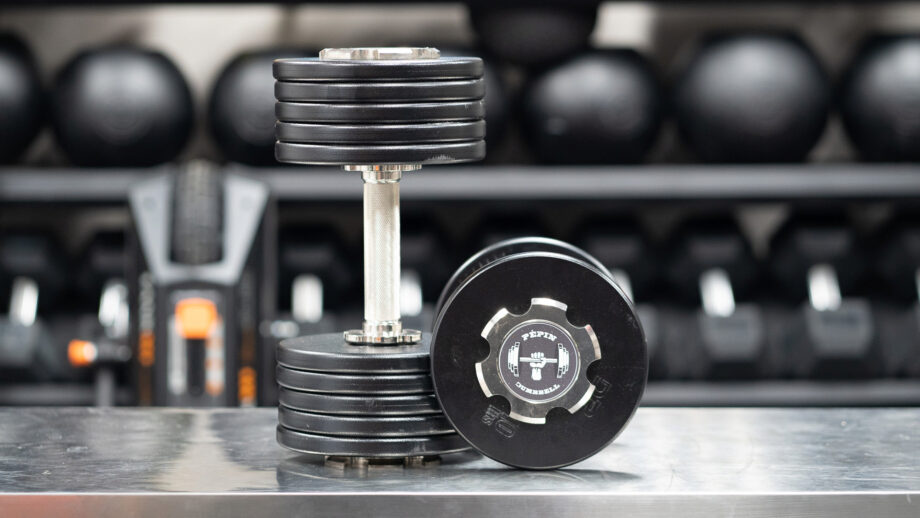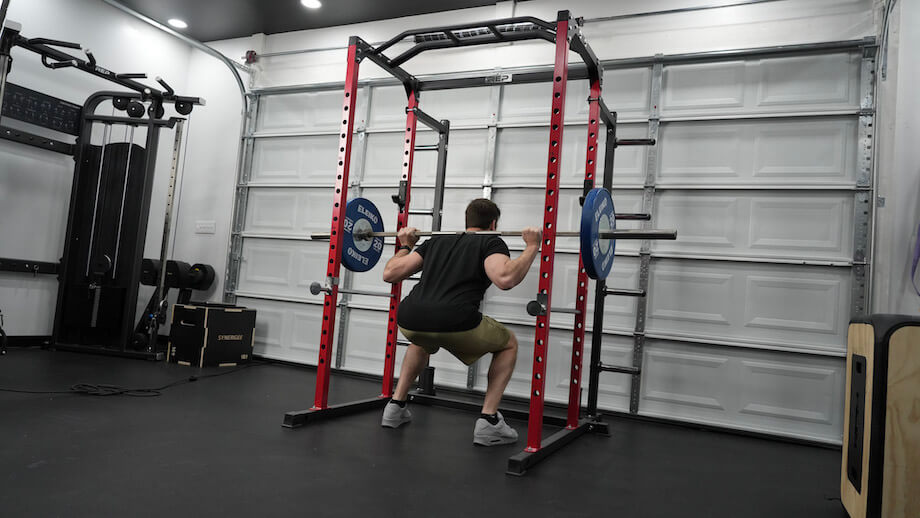If you’ve browsed our best fitness tracker roundup and want to learn more about Fitbit devices, you’re in the right place. Our experts have tested, scored, and reviewed most of the Fitbit models in the brand’s current lineup. We’ve also hand-selected our favorites and offered suggestions for the best Fitbit device based on your needs.
Our expert testers at Garage Gym Reviews are fitness professionals and hold some of the industry’s top certifications and credentials. Armed with extensive fitness and nutrition knowledge, our testers were asked to assess and score several categories including comfort, aesthetics, heart rate accuracy, activity tracking, battery life, connectivity, and ease of use. Later in this review we’ll dive into more details of each category and what constitutes a high score.
Let’s get tracking!
Best Fitbit Devices:
- Best Fitbit Overall: Fitbit Sense 2
- Best Budget Fitbit: Fitbit Inspire 3
- Best Fitbit for Beginners: Fitbit Charge 6
- Best Fitbit Smartwatch: Fitbit Versa 3
- Best-Looking Fitbit: Fitbit Luxe
Best Fitbit Overall: Fitbit Sense 2
Good for: Anyone looking for a powerful fitness tracker with the latest health features
Best Overall
Fitbit Sense 2
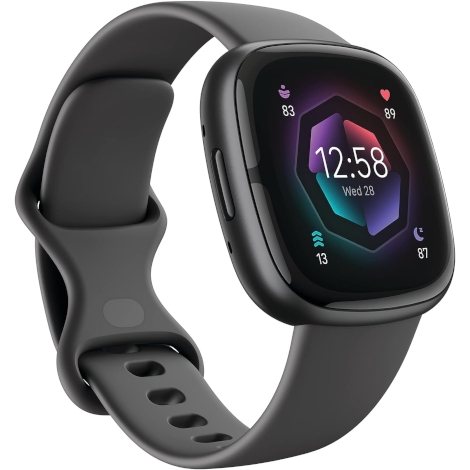
Product Highlights
- Smart watch and fitness tracker with a square screen
- Fitbit’s most advanced smartwatch
- Tracks exercise, sleep, heart rate, and stress
- Features cEDA, ECG, red, and infrared sensors
- Available in 3 colors
Pros & Cons
Pros
- Tracks your sleep and provides sleep score
- Fast charge—get 1 day of battery with 12 minute charge
- Amazon Alexa assistant built-in
- Includes 6 months of Fitbit Premium
- cEDA sensors to track stress
- Built-in GPS for phone-free workouts
- High and low heart rate notifications
Cons
- Google account required
- Full functionality—like readiness score—requires Fitbit Premium
- No music controls
- Customer reviews frustrated with customer support
- Reviews state the advertised battery life is not accurate
Bottom Line
The Fitbit Sense 2 is FitBit’s most advanced tracker designed to help users manage their fitness and stress better. It can track exercise, sleep, heart rate, and stress. Most reviews for this watch were positive. Customers disliked that some features and data required a Fitbit Premium subscription.
The Fitbit Sense 2 is a great choice for anyone who wants the best Fitbit smartwatch option. Much like some of the best Garmin fitness trackers, this Fitbit Sense 2 is an extension of your smartphone with the ability to answer calls, send texts, and use the built-in Alexa feature and GPS (without needing your phone nearby).
It can also track a ton of metrics including heart rate (resting, variable, and irregular heart rhythm), sleep cycles, stress, blood oxygen levels, breathing rate, skin temperature, exercise, steps, calories, distance, and more. Of all the capabilities, GGR Head of Content Nicole Davis was most impressed with the stress management options with all-day body-response tracking.
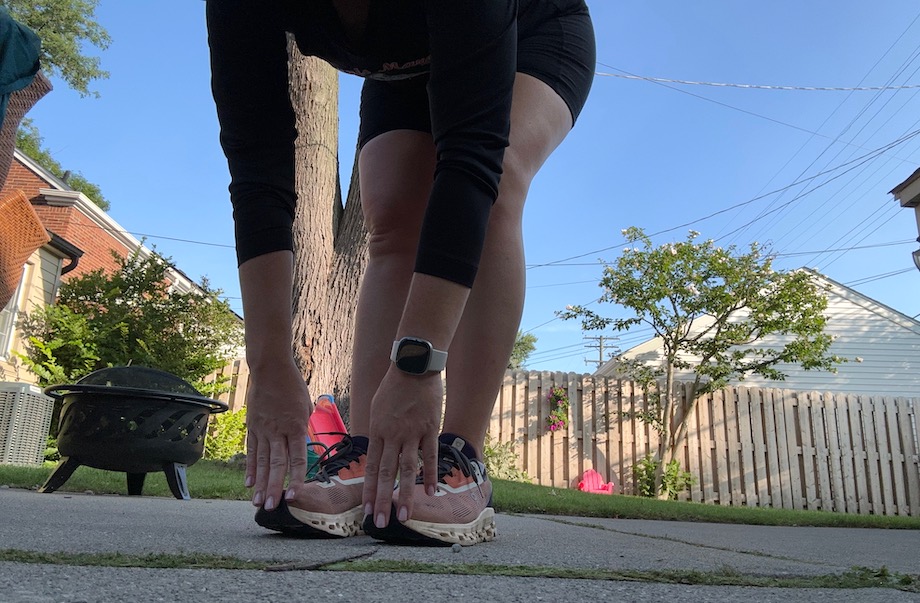
“The stress management score is one of the more unique features I’ve seen on a wearable device. And I’ve tested quite a few fitness trackers including an Apple Watch, Garmin Forerunner, and the Fitbit Inspire 3,” says Nicole.
Nicole explains that this feature tracks your body responses, which she speculated is any dramatic change in heart rate. The Sense 2 then notifies you about the stress response, gives you the option to reflect on how you’re feeling, and then provides options on how you want to respond (including physical activity and deep breathing). For tracking capabilities, Nicole scored the Fitbit Sense 5 out of 5 stars.
With the Fitbit premium membership you can dive even deeper into metrics like your sleep with a personalized sleep profile. However, without the premium version of the app, you’ll still be able to view your sleep score and review how long you spent in each sleep stage: light, deep, and REM.
When it comes to general wear and appearance, Nicole scored the Fitbit Sense at 4 out of 5 stars. “The Sense 2 is very Apple Watch-esque, which is totally fine in my opinion,” Nicole explains. “However, it’s a bit bigger, which is not awesome in my opinion. I’d much prefer to wear something a bit smaller.”
| Price | $299 |
| Built-in GPS | Yes; displays pace and distance without phone |
| Heart rate monitoring | Yes; during exercise, resting HR, and HRV |
| Water resistant | Yes; 50 meters |
| Battery life | 6 days; 2-hour charge time to reach 100% battery |
Best Budget Fitbit: Fitbit Inspire 3
Good for: Anyone looking to buy a fitness tracker without spending a ton of money
Best Budget
Fitbit Inspire 3
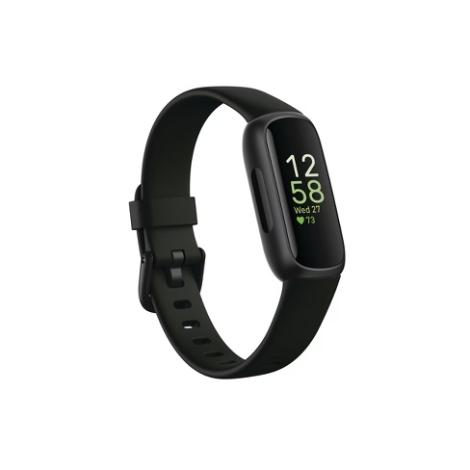
Product Highlights
- Affordable fitness tracker
- 3 colorways
- Additional bands available for purchase
- Up to 10 days battery life
- Water resistant up to 50 m
- Tracks heart rate, steps, blood oxygen, and more
- Provides sleep and stress scores
Pros & Cons
Pros
- Under $100
- 10 days of battery life
- Water resistant
- Color touchscreen
- Multiple colorways
Cons
- Small screen
- Needs to be connected to your phone for GPS
- Syncing to phone requires internet connection
Bottom Line
The Fitbit Inspire 3 is an affordable fitness tracker that still tracks a variety of activities and metrics—although the data is more basic than some more robust trackers. The Inspire 3 improves upon the design and aesthetic of the Inspire 2 with a streamlined look and color touchscreen. Additionally, it’s added a blood oxygen measurement feature, something that the Inspire line didn’t have up to this point.
The Fitbit Inspire 3 is not only a solid option for a fitness tracker, it’s also priced reasonably at $99, which is why it’s our budget pick for this roundup. You’re going to get a ton of health tracking options like heart rate monitoring, skin temperature, steps, distance, calories, exercise, blood oxygen, breathing rate, and sleep score—but without paying several hundred dollars.
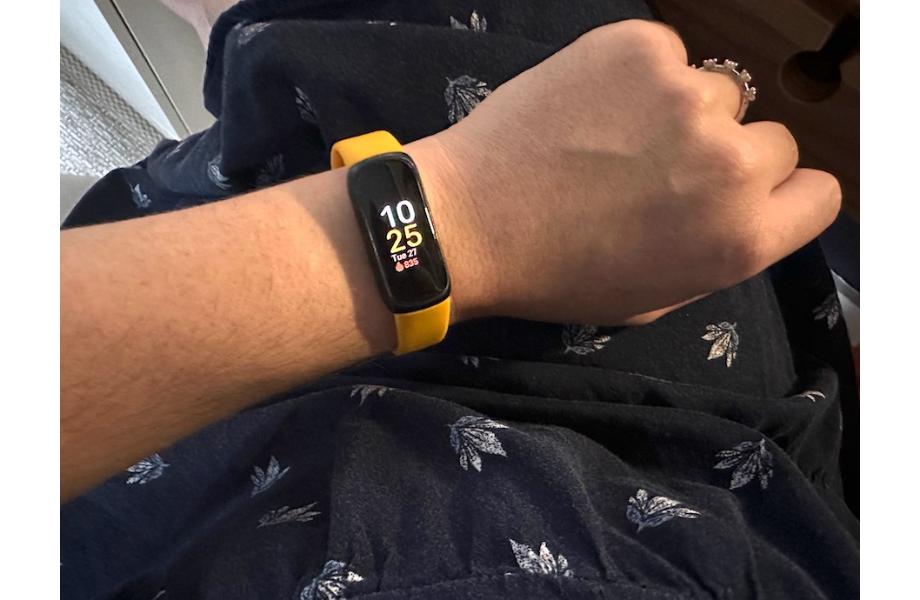
Keep in mind the budget price will come with a few less features, but that didn’t bother GGR Head of Content Nicole Davis. For example, the Inspire 3 provides a stress score, but not does not have the stress management features like the Fitbit Sense 2, as outlined above. You’ll also only be able to use GPS tracking when connected via Bluetooth to your smartphone, as the Inspire 3 doesn’t have built-in GPS. For this reason, the data tracking capability category earns 4.5 out of 5 stars.
“For $100, I think this thing is so worth it. It does almost everything the Fitbit Sense 2 can do, but at less than half the price. It’s a bit analog in terms of navigating the user interface—I like the Sense 2 for a more modern experience—but you definitely get your money’s worth,” says Nicole.
It’s also worth mentioning that Nicole liked how the Inspire 3 looked and how it felt on her wrist. For general wear, she scored the Fitbit Inspire 4.5 out of 5 stars. “After wearing the Fitbit Sense 2 for a while—and having an Apple Watch in the past—I prefer the slim look of this tracker.”
Nicole also appreciates the crystal-clear, full-color screen update from the previous iteration, which we have more details on in our Fitbit Inspire 2 review.
| Price | $99 |
| Built-in GPS | No, relies on phone connection |
| Heart rate monitoring | Yes; during exercise, resting HR, and HRV |
| Water resistant | Yes; up to 50 m |
| Battery life | 10 days; 2-hour charge time to reach 100% |
Best Fitbit for Beginners: Fitbit Charge 6
Good for: Beginners looking for a quality fitness tracker with a wide range of functionality
Best for Beginners
Fitbit Charge 6
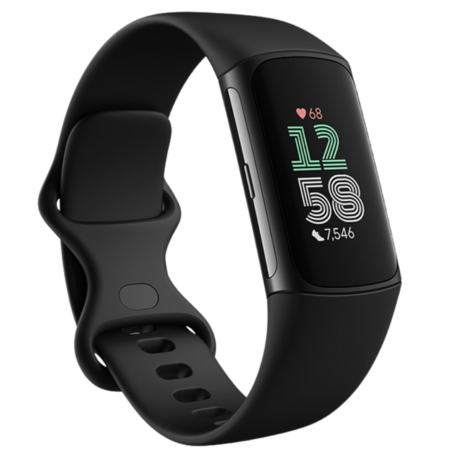
Product Highlights
- Fitbit’s No. 1 fitness tracker
- Built-in GPS
- Tracks exercise, sleep, stress, and heart rate
- 7-day battery life
- 3 colors available
Pros & Cons
Pros
- Built-in GPS for phone free workouts
- Features ECG app
- Tracks sleep
- 7 day battery life
- Heart rate appears on connected exercise equipment
Cons
- Google account required
- Reviews said watch disconnects sporadically
- Full functionality requires Fitbit premium
- Customer reviews frustrated with customer support
- Music controls only work with Youtube Music app
Bottom Line
The Fitbit Charge 6 is the newest version of Fitbit’s Charge series. It is an affordable fitness tracker with a lot of functionality like exercise, heart rate, and sleep tracking. It will work best if you are in the Google/Android ecosystem. Access to some data requires a Fitbit premium subscription. Customers generally liked the affordable watch, however, if they encountered an issue they were frustrated with the customer support.
The Fitbit Charge 6 is an excellent choice for fitness tracking beginners. GGR Editor and expert tester Frieda Johnson ordered the device, connected it to her phone, and tracked her daily movement for a full month before giving her assessment. Although Frieda is a fitness professional with nearly a decade of industry experience, this was her first fitness tracker (other than an OG Fitbit pedometer).
Frieda reports the Charge 6 was easy to pair with her phone (she uses an Android device) and has a long battery life. Because it was easy to use, offers tons of features, and is only about $160, Frieda thinks this is an excellent Fitbit device for beginners. “I personally think you get a lot for a $160 investment,” she says.
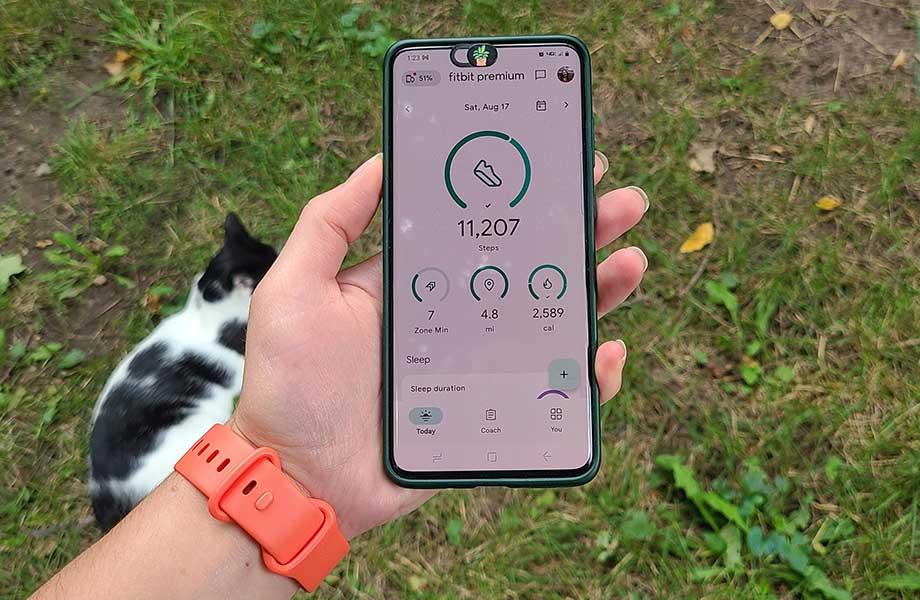
The Charge 6 can track a wide array of metrics including heart rate, activity, workouts, sleep, stress, blood oxygen levels, and skin temperature variation. And you can expect other heart rate-related metrics like heart rhythm assessments, heart rate variability, and resting heart rate.
RELATED: Target Heart Rate
Frieda scored the Fitbit Charge 6 at 5 out of 5 stars for activity tracking. “It tracks so many different things that I haven’t even used them all yet. That’s after a month of testing,” she says.
“I appreciate that I can check my notifications, set a timer, and track a workout without having to pull out my phone,” Frieda notes. She also liked the “smart wake” feature, which vibrates the device on your wrist during the most optimal sleep stage to wake up (based on when you want to wake up).
Frieda also notes the slimmer design of the Charge 6 may be favorable for beginners who aren’t used to wearing a fitness tracker. For general wear, she scored this tracker 4 out of 5 stars. She appreciated the slim profile and ordered the Charge 6 in the Coral/Champagne colorway, but notes it’d be nice to see more color options. Additionally, the tracker comes with two wristband sizes to accommodate a variety of users.
RELATED: Fitbit Charge 4 Review
| Price | $159 |
| Built-in GPS | Yes; displays pace and distance without phone |
| Heart rate monitoring | Yes; during exercise, resting HR, and HRV. Can also connect via Bluetooth to compatible cardio gym equipment |
| Water resistant | Yes; up to 50 m |
| Battery life | 7 days; 2-hour charge time to reach 100% |
Best Fitbit Smartwatch: Fitbit Versa 3
Good for: Folks looking for an Apple Watch alternative
Best Smartwatch
Fitbit Versa 3
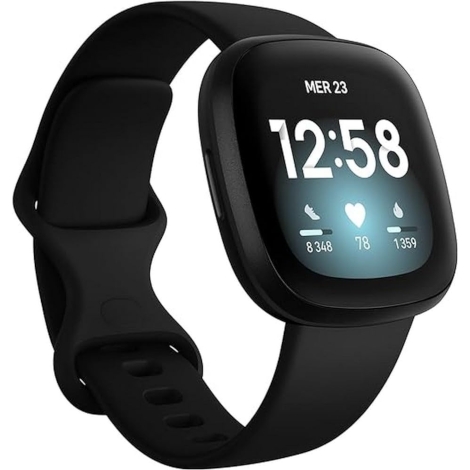
Product Highlights
- Smart watch with fitness tracking capabilities
- Track activity, sleep, and 24/7 heart rate
- Features voice assistant: Google or Alexa
- 4 colors available
Pros & Cons
Pros
- Includes 6-month Fitbit Premium membership
- Built-in GPS for phone-free workouts
- 6-day battery life with a full charge
- Tracks your sleep
Cons
- Full functionality—like readiness score—requires Fitbit premium
- Requires a Google account
- Customer reviews found the watch not durable
- Reviews state the battery life is not accurate
Bottom Line
The Fitbit Versa 3 tracks your activity, sleep, and 24/7 heart rate. To get all the available data you will have to subscribe to FitBit Premium. Fitbit advertises the watch with a 6 day battery life, but customers reviews state that isn’t accurate. Customer reviews also complained that the watch was not durable.
We chose the Fitbit Versa 3 as the best Fitbit smartwatch option because we think it’s an excellent alternative to an Apple Watch, Samsung Galaxy, or Garmin. It’s priced well under $200 and can track and monitor a wide range of health metrics.
You’ll be able to track your heart rate all day, including resting heart rate and variability. In addition to exercise, sleep, and stress, you’ll also receive a daily readiness score based on several of the metrics being tracked. The readiness score is something you’ll want to take with a grain of salt, but it can certainly provide insights into your recovery and may help you plan rest days.
The Fitbit Versa 3 provides the same smartwatch features you’ll see in other top name brands. You can take on-wrist Bluetooth calls, receive text notifications, and use Google Maps and Google Wallet. Plus, you can take advantage of built-in Alexa and GPS.
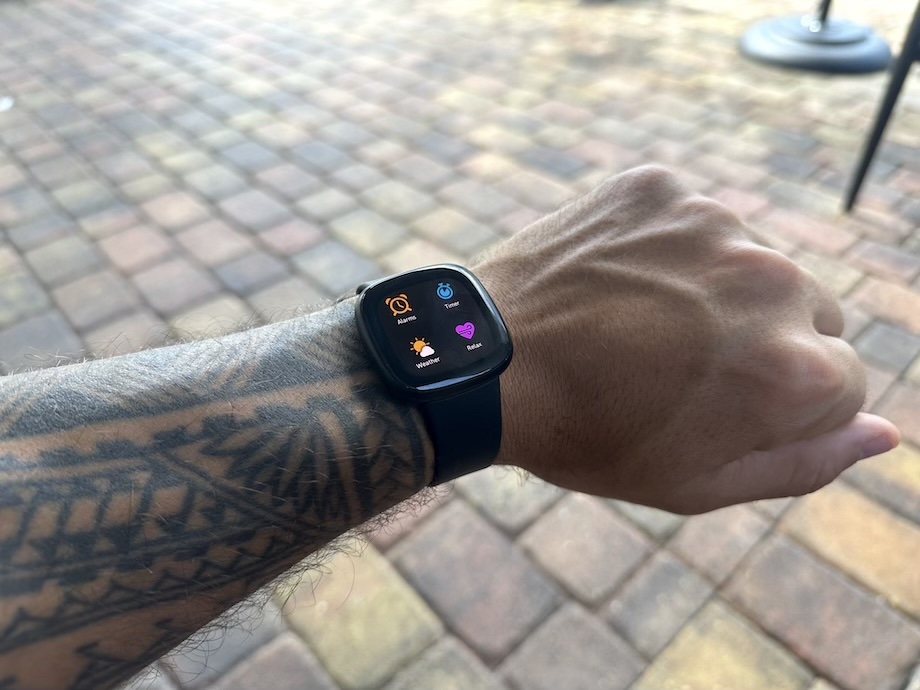
“The Fitbit Versa could be an affordable Apple Watch alternative for someone who’s interested primarily in fitness tracking. For under $200 this is a very good value and I would recommend it to friends and family,” says GGR Staff Writer and expert tester Stephen Sheehan.
That said, Stephen thought the response time on the touchscreen lagged a bit. He liked what the watch could do but thought the user interface needed a boost. For ease of use, the Versa 3 gets a 4-star rating.
Stephen wore the Versa 3 for several weeks and even compared some of the fitness and heart rate metrics to his Apple Watch Series 8 to see the differences. His main callout is the accuracy of the heart rate monitoring. When comparing the Versa to his Apple Watch, the Versa would typically provide lower BPM readings.
RELATED: Apple Watch Series 6 Review
Stephen also wore the Versa for HIIT workouts, knowing his heart rate would soar over 100 BPM, but the tracker never went above 110 BPM. “I was very out of breath, I know that wasn’t an accurate reading,” he says. For tracking your running heart rate, the Versa earns a 3-out-of-5-star rating.
Our testers have not yet tested the latest iteration (Versa 4) but hope to see if the accuracy of heart rate monitoring is more accurate when we’re able to do hands-on testing. As of writing this review, you can still purchase the Fitbit Versa 3 at third-party retailers like Amazon, Best Buy, and Walmart. We have more details about Stephen’s experience in our Fitbit Versa 3 review.
| Price | $165 |
| Built-in GPS | Yes; displays pace and distance without phone |
| Heart rate monitoring | Yes; during exercise, resting HR, and HRV |
| Water resistant | Yes; up to 50 m |
| Battery life | 6 days; 2-hour charge time to reach 100% |
Best-Looking Fitbit: Fitbit Luxe Special Edition
Good for: Folks who want to to track fitness metrics in style
Best-Looking
Fitbit Luxe
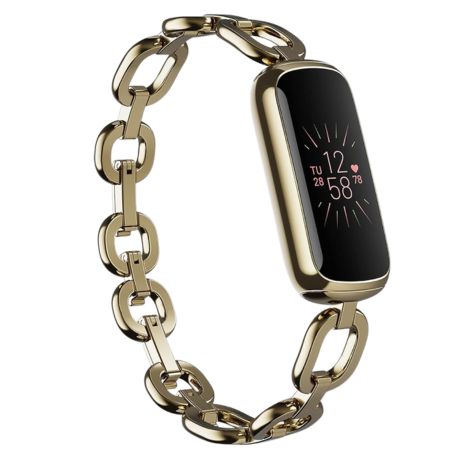
Product Highlights
- Fitness tracker with jewelry-like design
- Low-profile, less than 1″ wide
- Vivid AMOLED touchscreen display
- Tracks steps, calories, distance, etc.
- 24/7 heart rate monitoring
- Tracks blood oxygen levels
- Provides sleep and stress scores
Pros & Cons
Pros
- Low-profile display and design
- Polished stainless steel casing
- Great for those with smaller wrists
- Tracks tons of health metrics
- Sleep and stress score
- 20 exercise modes
- Water resistant
- Google Fast Pair
- Gold-plated jewelry-like wristband
- Up to 5-day battery life
- Responsive touchscreen
Cons
- Smaller face makes it difficult to read the display
- No tangible buttons (hard for some to navigate)
- Fewer stats displayed during a workout because of the face size
- No built-in GPS
Bottom Line
Overall, for around $150, the Fitbit Luxe is a budget-friendly, fashion-forward fitness tracker able to do most things you would want in a smart watch with impressive features found in higher priced options on the market. While the smaller size and elegant design options are attractive for many, the corresponding smaller text and screen is harder to read and navigate.
The Fitbit Luxe is a fitness tracker that functions a lot like the Fitbit Inspire 3, with a much more sophisticated package. The jewelry-like design offers a fresh appeal to the typical athleisure look of fitness trackers. The Fitbit Luxe Special Edition comes with the tracker, gold-plated stainless steel bracelet wrist band, and two peony classic wristbands (one small, one large). For general wear and appearance, the Fitbit Luxe earns a 5-star rating.
We haven’t yet tested the Fitbit Luxe, but the specs and customer reviews indicate it’s very similar to the Fitbit Inspire 3. Much like the Fitbit Inspire, there is no built-in GPS and it relies on your phone connection for GPS capabilities (unlike the Fitbit Sense or Versa). That also means you’ll only be able to see calls, texts, and notifications when your smartphone is nearby.
However, you’ll still be able to track a ton of health metrics including heart rate, exercise, step count, calories, distance, blood oxygen levels, breathing rate, and sleep and stress scores. With so much to track, the Luxe earns a 4.5 out 5 stars for data tracking capabilities. Like many of the other Fitbit models, the Fitbit Luxe has a skin temperature sensor to identify changes in your temperature, which can help inform you about illness or menstrual cycles.
Speaking of menstrual cycles, you can choose to manually track your cycles in the Fitbit app with all of the devices we tested, but it’s an in-app feature versus an on-wrist feature. The same goes for manually logging your food and water intake.
| Price | $199 |
| Built-in GPS | No, relies on phone connection |
| Heart rate monitoring | Yes; during exercise, resting HR, and HRV |
| Water resistant | Yes; up to 50 m |
| Battery life | 5 days; 2-hour charge time to reach 100 |
Other Fitbit Devices We’ve Researched
- Google Pixel Watch 2: Our expert testers have not yet tested the Google Pixel Watch, which is now part of the Fitbit lineup since it was bought by Google in 2020.
- Fitbit Versa 4: We’ve tested the Versa 3, but have not yet gotten our hands on the newest model to assess the updated features.
How We Picked and Tested
Our expert testers at Garage Gym Reviews were tasked with wearing, assessing, and scoring Fitbit devices after several weeks of testing and health tracking. Our experts used our in-depth fitness equipment testing methodology to score eight categories on a scale of 1 to 5. In addition to the categories listed below we also consider customer service and customer reviews.
- Activity tracking: High scores are assigned to devices that can track both strength training and cardio exercise.
- Heart rate tracking: Our testers consider HR accuracy based on manual BPM tests.
- General wear: Our testers consider comfort, aesthetics, and practicality of wearing a fitness tracker all day.
- Connectivity: The highest scores are given to devices with a built-in GPS, Bluetooth, and the ability to connect with third party apps.
- Battery life: High scores are reserved for devices that offer multiple days of battery life.
- Ease of use: Testers considered the user interface of both the app and wearable device.
Experts Who Contributed To This Article
What to Consider When Choosing the Best Fitbit
Since all Fitbit devices are compatible with both iPhone and Android devices, smartphone owners are not limited to choosing a Fitbit device based on connectivity. For your convenience, we highlighted the top things to consider when making a selection:
Price
Fitbit devices range from about $100 to $300, and that doesn’t include additional monthly fees for a Fitbit premium membership. There is a free Fitbit app version, so you don’t have to fret too much about being locked into a membership.
The Fitbit premium membership offers a few more exclusive features like details into your stress and sleep scores, a library of mindfulness sessions, recipes, and trainer-led workouts.
Battery Life
Battery life on most Fitbit devices ranges from 5 to 12 days. However, it depends on how much you use it and how you use it. For example, more push notifications to your wrist device may lead to a less extensive battery life, versus checking your metrics on your smartphone in the Fitbit app.
Additionally, some devices have built-in GPS capabilities (versus a Bluetooth GPS connection) which can dwindle battery life more rapidly.
GPS Features
Fitbit smartwatches offer built-in GPS capabilities that allow you to see your pace and distance on your wrist without the use of your smartphone. There is even a Google Maps feature that can help you navigate directions with turn-by-turn directions, which some folks may find helpful for exercising in new places.
On the flip side, there are two Fitbit devices (Fitbit Inspire 3 and Luxe) that don’t have built-in GPS technology. Instead, both devices use Bluetooth to connect to GPS from your smartphone. If built-in GPS tracking is important to your fitness routine, keep that in mind when selecting a device.
Benefits of Fitbit Fitness Trackers
There are many benefits of Fitbit fitness trackers, but our team agrees that some of the top advantages are tracking your heart rate, workouts, and general movement. A wearable fitness tracker can help you establish fitness goals and have accountability to make lifestyle changes.
A 2023 study published by the Journal of Medical Internet Research1 found that fitness trackers may not only support folks getting an adequate amount of movement each week, it may help people’s mindset around health and fitness.
Fitness Tracking Features
All the Fitbit devices we tested for this roundup have a very neat automatic exercise tracking feature, which ensures all your movement time is accounted for. Each wearable device auto-detects when you’re exercising and syncs your stats to the Fitbit app.
GGR tester Frieda Johnson had a slightly silly and anecdotal experience with the automatic exercise recognition when she was driving down a bumpy dirt road and her Fitbit Charge 6 started automatically tracking her exercise as dirt biking. “I can’t really hold that against the Fitbit,” says Frieda.
The auto-tracking typically picks up on walking, running, biking, rowing, elliptical workouts, aerobic classes, sports (such as soccer), and swimming on certain devices.
RELATED: Best Waterproof Fitness Trackers
Metrics Tracked
All Fitbit devices track step count and “active zone minutes” which is one way to track your target heart rate. Most devices also track distance and calories (with the exception of Fitbit Ace, which is designed for kids).
Additional stats and metrics—like sleep tracking, blood oxygen levels, irregular heart rhythm, and skin temperature—are now pretty much standard in all Fitbit devices thanks to ECG (electrocardiogram) and EDA (electrodermal activity) technology.
Keep in mind, some devices will offer more features and insights into each category. Additionally, with the Fitbit app all Fitbit fitness tracker users will be able to manually track other stats like water, food intake, body weight, and menstrual health.
Heart Rate Monitoring
All Fitbit fitness trackers and smartwatches we assessed for this roundup feature heart rate monitoring through an optical heart-rate sensor that flashes a green LED light multiple times per second. This reading tracks your blood capillaries in your wrist and can estimate your heart’s beats per minute.
Fitbits not only assess heart rate during exercise, but at rest too (aka resting heart rate). Heart rate monitoring also informs each Fitbit device for other metrics like calorie burn, sleep stages, and stress.
In addition to tracking heart rate during exercise and at rest, Fitbit devices also track HRV (heart rate variability) which is the measurement of time between heartbeats. It can be an important metric to track because downward trends in HRV could indicate overtraining or not enough sleep.
RELATED: 10 Signs of Overtraining
Most Fitbit devices can also identify irregular heartbeat and fibrillation with the ECG monitor.
Best Fitbit: FAQs
What is the best Fitbit out there?
Based on our experience, the best Fitbit device is the Fitbit Sense 2. It’s the most modern and has the most features. However, we enjoyed testing the Inspire 3, Versa 3, and Charge 6 for different reasons (like price, functionality, and features).
Are Fitbits being phased out?
The future of Fitbit smartwatches is pivoting to Google-branded smartwatches, which makes sense because Fitbit was purchased by Google in 2019. In August 2024, TechRadar reported Google will not manufacture future iterations of the Sense of Vera smartwatches. Instead, the Google Pixel Watch series will be the brand’s focus. However, we can anticipate fitness trackers Luxe, Inspire, and Charge to remain on the market.
Is the Fitbit Luxe or Inspire 3 better?
The Fitbit Luxe and Inspire 3 have practically identical specs, the main difference is the appearance of each fitness tracker and price. The Fitbit Luxe Special Edition is priced about $100 more than the Inspire 3. The Luxe also features a jewelry-like design with gold-plated finishes.
References
- Zahrt, O. H., Evans, K., Murnane, E., Santoro, E., Baiocchi, M., Landay, J., Delp, S., & Crum, A. (2023). Effects of Wearable Fitness Trackers and Activity Adequacy Mindsets on Affect, Behavior, and Health: Longitudinal Randomized Controlled Trial. Journal of medical Internet research, 25, e40529. https://doi.org/10.2196/40529




